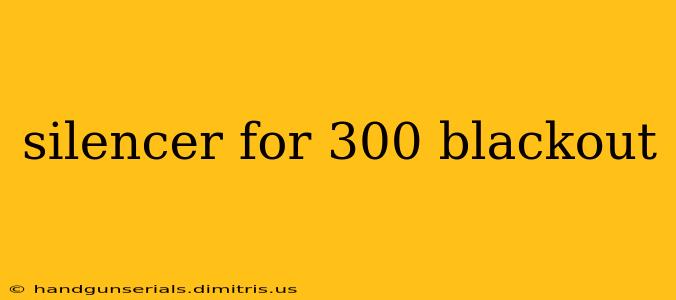The 300 Blackout cartridge has rapidly gained popularity among firearm enthusiasts, largely due to its versatility and effectiveness in various applications, from hunting to home defense. A crucial aspect often considered alongside this cartridge is the use of a silencer, also known as a suppressor. This guide delves into the world of 300 Blackout silencers, exploring key factors to consider when making your selection.
Understanding the Benefits of a 300 Blackout Suppressor
Before diving into specific suppressor models, let's examine why many shooters choose to use a suppressor with their 300 Blackout firearms.
-
Reduced Noise: The primary benefit is the significant reduction in noise. This is crucial for preserving hearing, improving situational awareness in tactical situations, and enhancing the overall shooting experience. 300 Blackout's subsonic capabilities are further amplified with a suppressor, making it exceptionally quiet.
-
Reduced Recoil: Suppressors can also contribute to a reduction in felt recoil, making the firearm more comfortable to shoot, especially during extended sessions. This is particularly beneficial for newer shooters or those with less upper body strength.
-
Improved Accuracy: By mitigating muzzle rise and recoil, a suppressor can indirectly contribute to improved accuracy, allowing for more consistent shot placement.
-
Flash Suppression: While not the primary function, many suppressors also effectively suppress muzzle flash, enhancing shooter safety and visibility in low-light conditions.
Key Factors to Consider When Choosing a 300 Blackout Suppressor
Selecting the right suppressor requires careful consideration of several factors:
1. Sound Suppression:
The level of sound reduction is paramount. Look for suppressors specifically designed for the 300 Blackout cartridge, as they are often optimized for its specific sound signature. Manufacturers usually provide decibel reduction ratings, allowing for comparison.
2. Durability and Construction:
Durability is key, especially given the potential for harsh operating conditions. Look for suppressors constructed from high-quality materials like stainless steel or titanium, known for their resilience and resistance to corrosion.
3. Weight and Size:
The weight and size of the suppressor will affect handling and balance. Larger, heavier suppressors offer better sound suppression, but can impact maneuverability. Consider your intended use and prioritize accordingly.
4. Ease of Cleaning and Maintenance:
Regular cleaning is essential to maintain suppressor performance and longevity. Choose a suppressor with a design that simplifies disassembly and cleaning procedures. Some suppressors offer quick-detach mounting systems for easier removal and re-attachment.
5. Compatibility:
Ensure the suppressor is compatible with your specific firearm's threading. 300 Blackout firearms typically use 1/2x28 or 5/8x24 threads, but always verify before purchasing.
Types of 300 Blackout Suppressors
While the specifics vary between manufacturers, 300 Blackout suppressors generally fall into these categories based on their design and construction:
1. Monolithic Suppressors:
These are single-piece units, often made from a single piece of metal, which are known for their robust construction and durability.
2. Multi-Chamber Suppressors:
These suppressors feature multiple chambers designed to baffle and redirect gasses, which often result in improved sound suppression.
3. K-baffled Suppressors:
These use a specific baffle design to efficiently reduce sound and pressure.
Conclusion
Choosing the right silencer for your 300 Blackout firearm involves careful consideration of your individual needs and preferences. By understanding the benefits of suppression, considering the key factors highlighted above, and researching reputable manufacturers, you can make an informed decision that enhances your shooting experience and improves safety. Remember to always consult with relevant legal authorities and adhere to all applicable regulations regarding suppressor ownership and use. This guide provides a starting point for your research; further investigation into specific suppressor models from trusted manufacturers is strongly recommended.

